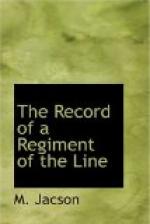[Illustration: En Route to Ladysmith]
The following officers were absent from the battalion
on leave in
England:—
Captain W.B. Lafone.
Captain G.M. Gloster.
Lieutenant H.N. Field.
Colonel J.H. Yule, commanding the battalion, was appointed to the command of the Indian Infantry Brigade, South Africa, with the temporary rank of brigadier-general. Major A.G. Spratt was placed in charge of the depot and details left at Jullunder.
The Regiment arrived without incident on September 21st at Bombay, having halted, for a few hours only, at the following places:—
On September 17th at Aligarh. " " 18th at Jhansi. " " 19th at Hoshangabad. " " 20th at Deolali.
Embarkation took place immediately on arrival, the transport Sutlej taking five companies, head-quarters, band and drums, under Major C.W. Park; and the transport City of London taking three companies under Major M.C. Curry.
On the latter vessel sailed also Sir George White’s Staff and the Staff of the Indian Infantry Brigade.
The Sutlej sailed at noon on September 21st, and it was reported that the ship was under sealed orders, and that her destination was Delagoa Bay.
The days on board were occupied in keeping the men fit with physical drill, free gymnastics, etc., and with instruction in first-aid to the wounded and the use of the field-dressing and the method of adjusting it.
On September 28th Agalega Island was sighted, and on the 30th the ship was off the east coast of Madagascar.
On the 2nd October the S.S. Purnea with the 60th Rifles on board was spoken, and communication by flag signal established, both vessels inquiring for news. The Sutlej was the last to leave port, but had nothing new to communicate.
At 7 a.m. on October 5th, in rough and foggy weather, the Sutlej arrived off the coast of Africa, and the fog lifting about midday, she ran down the coastline for two hours, and arrived outside the bar at Durban.
The ships conveying the 60th Rifles and the 53rd Battery arrived an hour later. The Sutlej waited till 2 p.m. to enter the harbour, and arrived alongside the quay at 4 p.m., when disembarkation commenced at once in torrents of rain and heavy wind squalls.
A deputation of the Durban “West of England” Association met the Regiment on arrival and presented an address.
The first news received on landing was that war had not yet been declared, but that it was inevitable, that President Kruger had seized half a million of money on its way from Johannesburg to the Cape, and that orders had been given by him to shoot any one crossing the frontier. This may or may not have been true; a good deal of perfectly reliable information was being circulated about this time.
On the night of October 5th-6th the Regiment left in three trains for Ladysmith. The rain and cold caused some inconvenience to the men, as they were packed into open trucks, and obtained neither shelter nor sleep. They were new to the game then, but they saw the inside of many a coal truck later.




